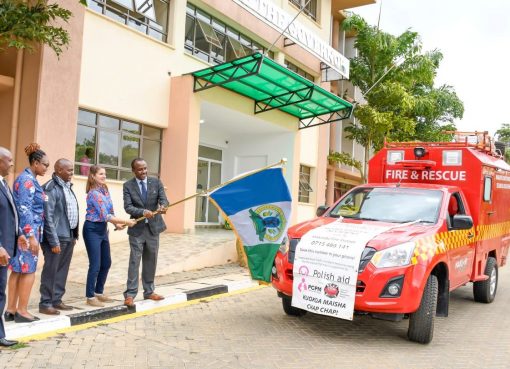Food and Agricultural Organization (FAO) has sponsored a farmers training program which was conducted by Kenya Management Information System (KIAMIS), a sensitization program on the use of digital platforms, to lower the cost of production in Uasin Gishu County.
About 25 farmers from Tapsagoi Ward, Turbo Sub- County are among the first beneficiaries of a training initiative of Food and Agriculture Organisation (FAO), with the support of the United Nations.
Mr Julius Rotich, Uasin Gishu County Chief Agricultural Officer, said the move is aimed at equipping farmers in accessing farm input at a subsidized cost, the correct quantities and correct time.

“We have been having a training which is more of a sensitization and status review to check on how far the system has gone in terms of implementation in putting all the farmers in our County under one platform which is KIAMIS,” said Rotich.
The County aims at connecting the farmers and managing them by helping them access farm inputs in the correct manner and of the best quality that has been certified.
National Value Chain Support Program (NVCSP) has the mandate to check on the system the challenges experienced by the system and the improvements worked on it so far.
“This system will assist farmers in Uasin Gishu in redeeming their vouchers and their conversations with agro-dealers and we encourage it to be rolled out across other Sub-Counties,” Rotich explained. The systems are set to help farmers across all the 30 wards across the County and Tapsagoi was picked as a pilot program to ascertain the authenticity of the system.
The system was tested last year and a few challenges arise that necessitate improvements to be carried out in further improving the system to perfection.
Some of the recommendations brought before the developers includes; delay in payments receipt messages, technical problems and levying a surcharge on electronic transactions.
The meeting was attended by agro-dealers who supply the inputs, the farmers who benefited with the training, a team from Kilimo handling the program.
“The challenges can be explained this way, Kenya Commercial Bank (KCB) holds the account, we have Safaricom with M-pesa and many at times the farmers will come complaining the system is hanging. Safaricom message is available to the farmer but agro-dealers have not yet received the message, a sort of an ecosystem operation. So, the aim now is to bring these three players onto one platform to receive transaction messages at once and exterminate time lapse experienced,” he explained.
The program will be of much importance to the County in the event that the National Government is providing a subsidy program on fertilizers and seeds.
The system also will help the county government in an extension program in solving their chronic problem of reaching out to farmers in rural areas and getting them trained.
Rotich indicated that in a click of a button they will be able to connect with farmers on the ground in accessing information on challenges because of the data available from registered farmers in one platform.
The County will avail criteria in identifying who a farmer is and put in various categories such as value chain, size of the land such as large-scale farmers, medium scale farmers and small-scale farmers.
The advantages of the system are that it will help the county understand the Quantity of the farm inputs such as Maize, Avocados, coffee that will be produced and help the farmers redeem the E-voucher system. This will help both the National government and County government in proper planning in relation to food security and projection of the day how much the county will produce.
Kenya Bureau of Standard (KEBS) have been giving estimate data and they do so after some time on food production estimates. The KIAMIS is going to be an accurate figure instantly at a click of a button.
A further proposal seeks to realize an independent body that will regulate on farm inputs such as the Energy Regulatory Commission (ERC) which has stabilized the oil market in the country. An independent entity will be able to solve the perennial challenge of the farming industry in protecting the farmers.
“FAO has been very supportive in sponsoring development of this software that has been successful in other countries including Zambia but needs modification to fit the Kenyan context,” reiterated Rotich.
By Hassan Adan Ali




